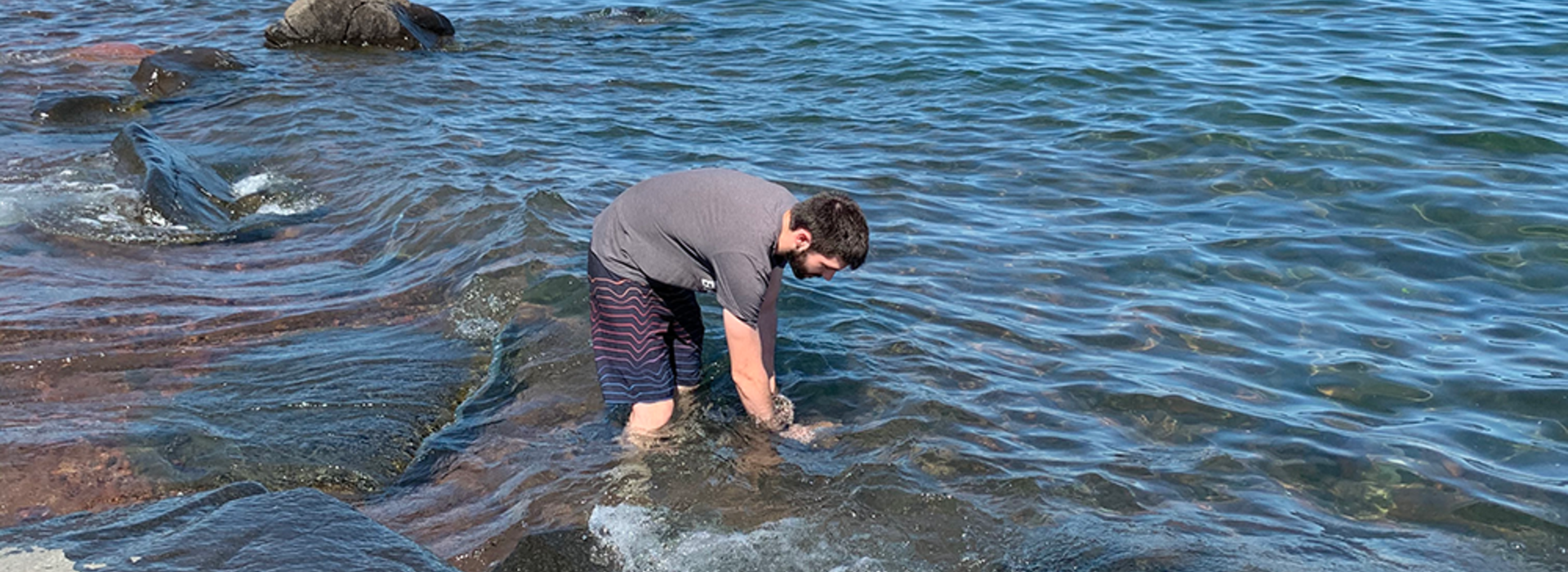
U of M Researcher Monitors Duluth Beaches for the Presence of SARS-CoV-2
More Minnesotans are turning to lakes and beaches for recreational fun as a safer alternative during the COVID-19 pandemic. To study how safe, though, a researcher from the University of Minnesota Medical School, Duluth Campus is testing the surface water on the shores of eight Duluth beaches for the presence of SARS-CoV-2.
“It’s unknown territory,” said Richard Melvin, PhD, assistant professor in the Department of Biomedical Sciences, who leads the study. “We’ve got a major tourism industry and people coming up here to enjoy Lake Superior. It’s a nationwide question: is this novel coronavirus getting into the water at recreation sites? We want to know.”
The study, funded by the Minnesota Sea Grant, started after the public began asking the organization about whether or not beaches were safe. The Minnesota Sea Grant wanted to find answers, so they awarded Dr. Melvin’s lab with a development grant to lead the study.
“There is a possibility that people who are visiting beaches and entering the water can bring and leave behind virus particles. Yet, water has not been shown to be a significant source of infection, and viruses that end up in freshwater are thought to degrade rapidly,” Dr. Melvin said. “However, we want to provide clear, scientifically sound information that citizens, public officials and business owners can use to make informed decisions about water-related activities.”
The public beach sampling locations were chosen based on visitor popularity that includes Leif Erikson Park, 42nd Avenue Beach, Brighton Beach and Minnesota Point, also known as Park Point, which will incorporate the seven-mile-long sandbar’s Pine Forest, Park Point Beach House, Lafayette Community Center, Franklin Park, as well as the 15th Street Harbor-side location.
Using the CDC's 2019-nCoV Real-Time RT-PCR diagnostic panel designed for research use, Dr. Melvin began testing water samples in early July. To ensure that his lab can recover virus from lake water and that testing will work, his lab is also checking the samples for the presence of the Pepper Mild Mottle Virus (PMMoV), which is commonly found in human waste after the consumption of processed foods containing chili peppers. The PMMoV serves as a marker to confirm the detection of human presence.
“In our samples so far, we were able to detect the pepper virus, so we know our detection system is solid,” Dr. Melvin said. “In those same samples, we have not detected SARS-CoV-2, which means it’s either absent or at very, very little concentration.”
Even though Dr. Melvin’s tests so far have not detected SARS-CoV-2, he recommends that beachgoers continue to follow the CDC recommendations on beach safety related to the COVID-19 pandemic.
“It’s important to know that even though we have not detected SARS-CoV-2 in the water, transmission prevention when you’re at the beach still requires you to social distance and wear face coverings around other people,” Dr. Melvin said.
The team will continue collecting samples and monitoring for the virus through the end of September. As the data is collected, regular reports will be shared with Minnesota Sea Grant, which will then be communicated to the Minnesota Department of Health and the City of Duluth. Minnesota Sea Grant will be providing weekly data reports and real-time updates for this ongoing project at www.parkpointbeach.org.
“The spirit of this project is not to say, ‘get off the beach,’” Dr. Melvin explains. “It’s more about enjoying our summer months at the beach with precaution as we deal with the pandemic.”